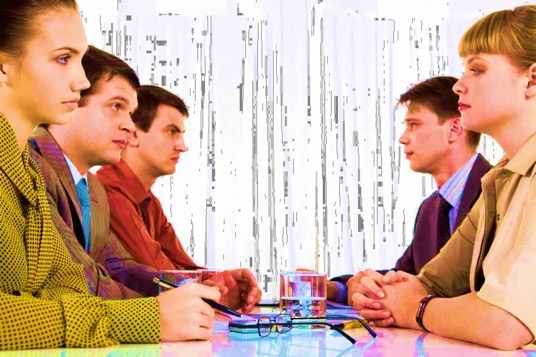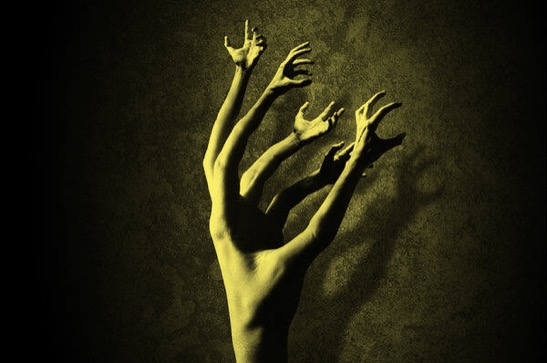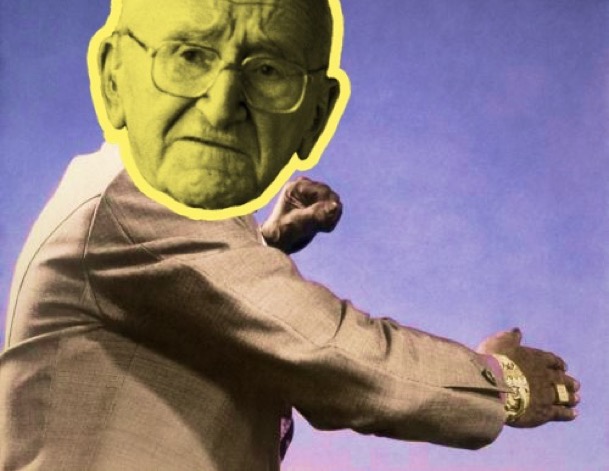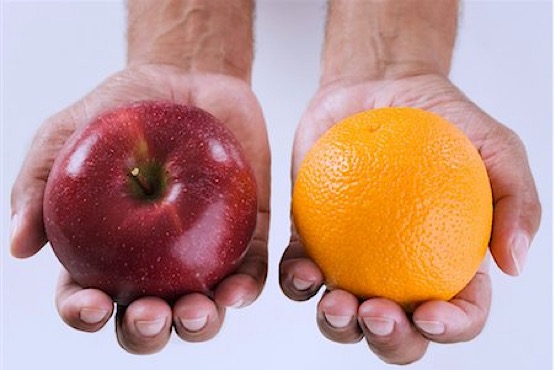No invisible hand guides the hearts of the people.
Two Cheers for Liberal Fideism
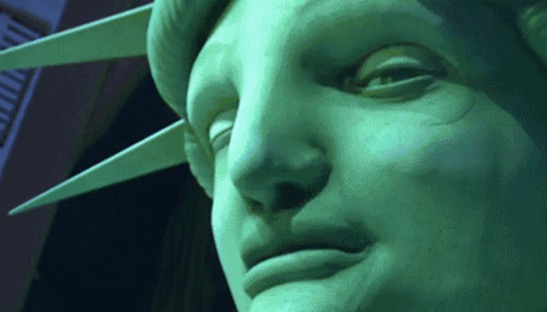
A different leap of faith could be far more dangerous.
One defense of classical liberalism is what Friedrich Hayek called “the knowledge problem”—the idea that economic knowledge is too complex, too diffuse and maldistributed, for a central planner to aggregate. Markets solve this problem, Hayek claimed, by coordinating information across discrete, far-flung actors, thus achieving better outcomes than would be possible under a more centralized system.
Crucially, no single person intends these outcomes; they are the “result of human action,” not “human design.” And that “invisible hand” structure characterizes many other liberal arrangements as well: Madisonian checks and balances, where institutional competition leads to liberty; the Millian marketplace of ideas, where ideological competition leads to truth; and even the modern courtroom, where litigation leads to justice.
But what if instead of order, these antagonisms just produced chaos? What if the invisible hand is invisible because, well, it doesn’t exist? What if the whole thing is just smoke and mirrors, and what if the mirrors start to crack?
That’s the frightening suggestion of Adrian Vermeule’s American Affairs essay, “Liberalism and the Invisible Hand.” Vermeule argues that “liberal faith in these systems far outruns any…evidence adduced to support them.” This is no accident but an ingrained structural feature, built-in and unavoidable. Liberalism displays “self-undermining” tendencies that “prevent its invisible hand systems from fully realizing their promise.” And by their own terms, it’s difficult to verify whether such systems work at all. If we don’t know what an efficient allocation of goods looks like, how can we be sure markets operate efficiently? And if we don’t know what truth is, how can we be sure “free and open discussion” will reveal it?
We can’t be, Vermeule concludes. “Having dispensed with the superintending design of Providence,” liberalism finds that “there is no guiding hand to ensure the fulfillment of its own faith.” It therefore turns to “liberal fideism, insist[ing] ever more stridently on the truth of” its unverifiable claims.
What makes this reasoning so clever is the way it flows naturally from liberalism’s own commitments—from epistemic humility to self-defeating skepticism. It’s simple, elegant, why-didn’t-I-think-of-that obvious, and I imagine we’ll hear it repeated (if not in so many words) as more liberal democracies come under strain.
So now would probably be a good time to take stock of Vermeule’s argument—what it shows, what it doesn’t, and where it leads—without the Twitter triumphalism of his critics.
Liberalism’s Identity Crisis
Though liberalism does not necessarily abjure a concern for “the good,” however that term is defined, it does place serious constraints on how the good may be pursued: not via “authoritative commands,” as pre-modern doctrines assume, but, says Vermeule, through the “freely chosen…actions” of individual agents. The invisible hand is thus an “indispensable trick that allows liberalism to square the provision of human goods with its” commitments to human freedom. We needn’t choose between rights and resources, liberty and security; the former will result in the latter, provided certain conditions are met.
Vermeule describes this conceit as a kind of secularization. Whereas Providence is “directive, purposive, and authoritative,” liberalism is aimless, decentralized, and mechanistic. By substituting private action for divine design, it links human flourishing to human choice—and only that choice—rather than to some higher being. The sacred, the supernatural, the celestia all drop out of the picture, made superfluous by humanity’s hidden hand.
This in turn raises the stakes of Vermeule’s project, because if he can show that the emergent, system-wide benefits of liberalism are factitious, he won’t just have undermined our politics but our cosmology, and opened up space for a new one. “The triumphalist version of the liberal faith is that, having finally transcended the great fallacy that ordered liberty requires a Designing Hand, we can now see how ordered liberty and its resulting goods arise indirectly.” But if liberalism cannot validate these claims, it looks to be a religion like any other, in need of pre-rational justification. Which religion is true is a separate issue, Vermeule concedes, “but liberalism’s invisible hand accounts—perhaps it would be better to call them parables—are no less complex and challenging than the providentialist parables they would replace, and the necessary miracles no less astonishing.”
So construed, the essay isn’t trying to tell us which regime type we should prefer. It’s more of a leveling argument, an attempt to put liberalism on equal footing with its competitors. Vermeule goes about this in two ways: by pinpointing design flaws that prevent invisible hand systems from “performing as promised,” and by raising epistemic doubts about our ability to evaluate performance at all.
The first move recapitulates the Tocquevillian notion that liberalism is self-undermining. It erodes bonds, erases norms, and dissolves loyalties that are necessary for invisible hand systems to flourish. If, for example, markets “form liberal agents with dispositions that undermine the norms of good faith”—the very norms that sustain the market—then economic freedom (and much else) will eventually disintegrate.
The second move—”the dilemma of verification”—is arguably more radical. It claims classical liberalism is not just wrong but incoherent, predicated on a contradiction:
If individual goods…could be directly identified, generated, and allocated by the political authority, there would be no need for the indirection of liberalism’s invisible hand. In a famous observation about competition as a discovery procedure, Hayek noted that “it would be patently absurd to sponsor a contest if we knew in advance who the winner would be…. [Thus] the validity of the theory of competition can never be empirically verified for those cases in which it is of interest.”
In other words, we can’t verify that liberalism “works” under liberalism’s stated premises: Either social reality is too complex to be understood by a single agent, in which case nobody can be sure liberal institutions are performing as promised; or it isn’t, in which case the raison d’être for liberalism collapses. If we know enough to know that liberal institutions are coordinating people effectively, then presumably we know enough to do the coordinating ourselves—that is, to transcend the invisible hand. Liberal self-defeat doesn’t just occur in practice, then; it also occurs in theory, the moment liberalism seeks to justify itself.
Liberalism By Its Fruits
But hang on: Doesn’t the claim that invisible hand systems tend to break down presuppose our ability to tell whether they break down, which is precisely what the verification dilemma denies? There seems to be a contradiction here. If we can’t be sure markets “process information effectively,” how can we be sure markets are self-destructing? And if we can’t be sure liberalism has a “structural propensity” to produce the good, how can we be sure it has a structural propensity to produce the bad, as Vermeule has explicitly argued elsewhere? The dilemma proves too much.
Furthermore, it assumes it’s impossible to ascertain the properties of a system without first ascertaining how every cog in the system works. But this is false: We routinely identify system-level properties without knowing much about the underlying motors that produce them. We know the brain analyzes information, even though we don’t fully know how; we know DNA affects personality, even though certain genes remain opaque.
And we know liberal democratic capitalism has generated prosperity, raised living standards, and spurred innovation to a degree unimaginable in most pre-liberal societies. It’s entirely fair, of course, to ask how much these innovations should weigh in a holistic theory of the good; my answer, and probably Vermeule’s, is that they’re overrated. But this is to change the subject. Liberalism’s central claim about liberty—that it “tends to produce the good indirectly”—is clearly true to some extent along multiple dimensions, even if along others (community, piety, equality) it isn’t.
Indeed, Hayek addresses the verification dilemma in the very paper Vermeule cites: “the merits of competition cannot be empirically verified…they are recognized only because they have actually provided better results than alternative procedures.” Provided we identify a measurable set of goods, in other words, we can judge invisible hand systems based on their relative performance. To be sure, such judgments require that we disentangle correlation from causation; perhaps liberal societies are liberal-because-prosperous, not the other way around, or perhaps liberalism and prosperity are both caused by some third factor. But we generally can verify that system A has more prosperity than system B, even if the reasons why are unclear.
Liberalism’s Final Frontier
So far I’ve been treating the verification dilemma as a theoretical argument and responding to it in kind. Yet Vermeule insists his interest is not “liberalism as theory,” but as “an operating sociopolitical regime.” It is this “concrete” liberalism that “is astonished to find that there is no guiding hand to ensure the fulfillment of its own faith”—that doubles down on its premises even as they are mugged (over and over again) by reality.
But what exactly does this mean? Political systems do not have mental states; they cannot experience “astonishment” or “hope” except insofar as their handmaidens do. Vermeule made much the same point last year, in his critique of Why Liberalism Failed, when he chided Patrick Deneen for
Writ[ing] as though “liberalism” does things, says things, believes things…. This is a methodological shorthand, an implied promissory note to pay our methodological debts in the future, and the bill comes due before the author may leave the premises. At some point one must ground the behavior of “liberalism” in the desires, beliefs, and opportunities of liberal agents.
Vermeule incurs similar debts here, and, like Deneen, never quite pays them back. His 60-plus footnotes include plenty of links to political theorists—Smith and Schmitt, Hayek and Hirschman all appear more than once—but few to sociologists or historians or opinion-leaders, the folks in touch with modernity’s cultural logic.
It is thus unclear where liberal fideism enters the picture. Do some intellectuals make grand, unverifiable statements about liberalism? Sure—but Vermeule just said intellectuals are not his target. Is the claim that ordinary people tend to develop unjustified confidence in invisible hand systems, resulting in a kind of false consciousness? Plausible, but debatable too, and not obviously supported by Vermeule’s citations.
Or is it that a certain mode of discourse, on both the Left and the Right, eschews Hayek’s comparativism for blind triumphalism, the insipid, arc-of-history cant that peppers so much establishment rhetoric nowadays? This, I think, is Vermeule’s real target: those who assert liberalism is not just good but supreme, that it is better than any alternative humanity has tried or could ever try in the future.
And against such people, Vermeule succeeds spectacularly. Because if we can’t be sure how or why invisible hand systems produce the good, how can we be sure there’s nothing out there capable of transcending liberalism? How can we be sure there’s nothing better than the best-so-far, assuming, arguendo, that liberalism is indeed our best?
We can’t be, which is the point. A grounded, skeptical liberalism can handle extant cases with relative ease—where would you rather live, America or North Korea?—but not new modes and orders, systems that have not been tried and so cannot be compared to what has been.
Although Vermeule calls liberalism a “theology,” then, he is really dispelling its theological character. If liberalism claims to maximize the good, it’s unverifiable as Vermeule has shown; but if it doesn’t, it’s no longer universal, true in all times and places. The liberal thus faces a choice between incoherence on the one hand and contingence on the other, and being committed to reason is forced to choose the latter. This of course plays right into Vermeule’s hands, for once liberalism’s limits have been established it becomes possible to think beyond them and imagine a genuinely postliberal horizon—one more accommodating of planning, more friendly to Providence.
From One Wager to the Next
With that, the reset is complete. Vermeule has not “owned the libs,” per se, but he has punctured their armor, and opened up space for new challengers. Or—put differently—he’s weakened liberalism’s monopoly on the marketplace of ideas, thereby making that market more competitive.
Left unexplored, however, are the various equilibria such a competition might produce: the schemes and systems and settlements that could (in both a literal and figurative sense) come after liberalism.
And here, a curious role-reversal occurs. It is the liberal, after all, who believes free and open debate generates truth; by his own lights, competition is a positive good. Yet for those who reject this conflict-based epistemology—which is to say, for people like Vermeule—the calculus becomes more complicated: If liberalism is false, undermining its grip on discourse may well be beneficial. But then—precisely because liberalism is false—taking that step also means taking an enormous risk, since there is no guarantee the “true” postliberal system will emerge.
As Vermeule notes, “research programs in cognitive and social psychology and behavioral economics have radically undermined any remaining, naïve faith that truth will automatically tend to ‘win out’ in free and open discussion.” And just in the past generation “we have seen democratic polities with expansive constitutional protections for free speech…make extraordinary mistakes of policy based on distorted information and distorted, ideologically inflected processing of information.” The educated elites of these polities, “who pride themselves on their discursive rationality and commitment to evidence, are not obviously any less susceptible to the rationalization of political prejudices, nor any more open to evidence, than the public at large.” So, on Vermeule’s own theory of the case, his leveling project could prove very, very dangerous.
Danger can be worthwhile, of course, especially in times of decadence and dissolution. And I don’t mean to suggest all postliberals are created equal—Vermeule’s own political theory, described across various writings and speeches as a kind of integralism, hardly resembles fascism or communism or accelerationism, even when it attacks key pieties of liberal dogma. The important point is that there is no way to know in advance which of these “-isms” will win out once we open them up for debate. We might end up with a communitarian-localist paradise overseen by benevolent aristoi, but then again, we might not, and the cure could be worse than the disease. (I take it as axiomatic that some regimes are worse than liberalism, even if others are better.)
Pace Vermeule, then, the fideistic character of invisible hand systems may be one of the stronger arguments on their behalf. That faith is a known, non-zero quantity, whereas apostasy is not—and most people are at least somewhat risk-averse about upending established political orders.
Still, it’s very much an open question whether liberal fideism can survive given the current threats to its legitimacy. And should it collapse in due course—or, heaven forbid, all at once—we’ll inhabit a situation much like the one Vermuele is pushing toward: a chaotic marketplace of ideas in which no regime is excluded, no outcome preordained.
Which gives you an idea of why Vermeule is playing with dynamite, but also why dynamite could be useful: because a planned demolition is typically less deadly than an unplanned one, without an ambulance or response team on hand.
So to the extent Vermeule raises these specters before they materialize, while liberalism still possesses some structural integrity, perhaps he’s doing us a service by girding our loins for the wars to come.
Or maybe he’s just courting war by exposing a noble lie. Best buckle up either way.
The American Mind presents a range of perspectives. Views are writers’ own and do not necessarily represent those of The Claremont Institute.
The American Mind is a publication of the Claremont Institute, a non-profit 501(c)(3) organization, dedicated to restoring the principles of the American Founding to their rightful, preeminent authority in our national life. Interested in supporting our work? Gifts to the Claremont Institute are tax-deductible.
Disillusioned liberalism can pull us from the hellbroth of clashing absolutists.
Life under liberalism is servile, though there is no slavery.
Vermeule's Adam Smith is a straw man.
Is liberalism still entitled to give itself a hand?

